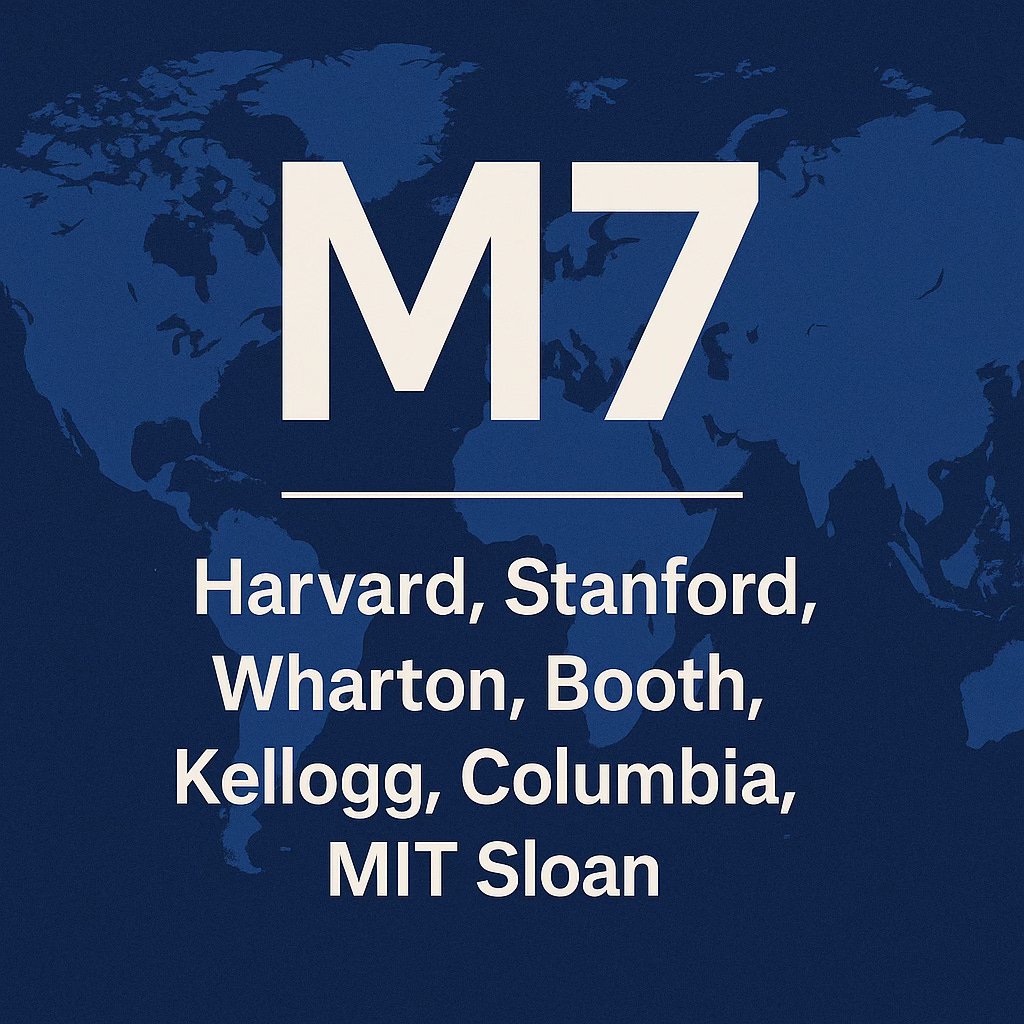M7 by the Numbers: What the Latest Data Means for Japanese MBA Applicants
Why now might be the best time to apply — despite global uncertainty
Original article by Poets&Quants: The M7 By The Numbers: 2025 Edition – Who Gets In & What That Says About the MBA Market
Poets&Quants recently released their annual breakdown of the M7 MBA programs — Harvard, Stanford, Wharton, Booth, Kellogg, Columbia, and MIT Sloan. For anyone considering applying to top U.S. business schools, the numbers offer useful insights into the state of the MBA market. For Japanese applicants, they also raise some important strategic questions.
Here are my key takeaways — and why I believe this might be a uniquely good moment to apply despite the numbers.
1. Test scores are high — but not enough to stand out
At most M7 schools, the average GMAT now hovers between 730 and 740. GRE scores are also climbing. In other words, high scores are the norm, not the differentiator.
For Japanese applicants, this means: a 700 GMAT may no longer be a “safe” score, but a 715 alone won’t get you in either. Top schools want applicants with both intellectual horsepower and a clear, compelling story. Strong scores help you get noticed — but your essays, resume, and recommendations still do the heavy lifting.
2. International representation is high — but so is competition
Many M7 schools now report 35–47% international students, which sounds encouraging. But within that pool, applicants from India and China dominate the numbers — and face intense competition. For the coming year, however, this may not be the case. More on that in section 5 below.
Japanese applicants remain relatively underrepresented, which can be an advantage — but only if you clearly show how your unique background and perspective will enrich the classroom. The admissions team won't automatically understand the challenges of working in a Japanese corporate or government context. You need to explain it.
3. Non-traditional candidates are on the rise
While consulting and finance remain dominant, schools are increasingly open to candidates from public sector roles, startups, tech, and social impact fields. If you’ve worked in a traditional Japanese company, your job title alone may not grab attention — but if you’ve shown initiative, led change, or built something new within a rigid system, that will stand out.
4. Acceptance rates are still falling
Stanford’s admit rate is now down to 7%. Others in the M7 are in the 10–18% range. That means excellent candidates often don’t get in. It’s a reminder to apply broadly and manage risk: even the most qualified applicants need a mix of dream, competitive, and safer schools in their portfolio.
5. What the article doesn’t say: The Trump Factor — and a hidden opportunity
One important element missing from the Poets&Quants article is the political context. Donald Trump’s return to the White House is already making many international applicants hesitant. Concerns about immigration policy and visa restrictions have led some candidates to reconsider studying in the U.S.
In particular, a decline in Chinese applicants is expected. This is due in part to statements like the following from the U.S. State Department:
“Under President Trump’s leadership, the U.S. State Department will work with the Department of Homeland Security to aggressively revoke visas for Chinese students, including those with connections to the Chinese Communist Party or studying in critical fields. We will also revise visa criteria to enhance scrutiny of all future visa applications from the People’s Republic of China and Hong Kong.”
These developments are understandably concerning. Some of my own clients have experienced visa processing delaysthis year, but the good news is: none have been denied. The process has slowed — but it is still functioning.
In fact, this may represent a hidden opportunity. If a portion of the global applicant pool pulls back this year, the competition could become slightly less intense — especially for strong, underrepresented applicants from Japan.
Final Thoughts
If you’re thinking about applying to an M7 school, don’t talk yourself out of it. Apply to your dream school — but make sure it's part of a smart, balanced list. Prepare strategically, tell your story authentically, and make your application impossible to ignore.
If you are considering graduate study abroad and want to explore your options, visit www.roahconsulting.jp or reach out directly at info@roahconsulting.jp. I would be happy to help you take the first step.


